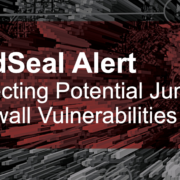Custom Best Practice Check for Detecting Juniper Firewall Vulnerabilities
Name: Juniper Firewall Vulnerability Detection Description: This Custom Best Practice Check (CBPC) detects potential vulnerabilities in Juniper firewalls that could lead to unauthorized access and remote code execution.
Rule: Regex: ^ *web-management \{(\r?\n) *htt.*
Explanation: This regular expression (regex) is designed to match specific configuration lines within a Juniper firewall’s configuration related to web management settings. It identifies lines that start with zero or more spaces, followed by the string “web-management {” and potentially followed by any characters related to HTTP settings.
Purpose: Juniper firewalls are known to have vulnerabilities (CVE-2023-36844, CVE-2023-36845, CVE-2023-36846, CVE-2023-36847) that can allow unauthenticated attackers to upload arbitrary files and potentially execute remote code. This CBPC aims to identify configurations related to web management, as attackers often exploit such configurations to gain unauthorized access and control over the device. Detecting such configurations will help security teams identify potential vulnerabilities and take appropriate action.
Instructions:
- Log in to the RedSeal platform.
- Navigate to the “Best Practices Checks” section.
- Create a new CBPC and give it a meaningful name and description.
- Copy and paste the provided regex (^ *web-management \{(\r?\n) *htt.*) into the “Rule” field.
- Save the CBPC and run it against the target Juniper firewall configurations.
Outcome: When the CBPC is run against Juniper firewall configurations, it will identify any lines that match the provided regex pattern. If matches are found, it indicates potential vulnerabilities related to web management settings that might need further investigation and remediation.
***Please note that while this CBPC can help in identifying potential vulnerabilities, it’s important to have a thorough understanding of your network environment and configurations. Always perform additional assessments and validations to ensure accurate results.***
Vulnerabilities Overview:
- CVE-2023-36846 and CVE-2023-36847: Remote Code Execution via J-Web:These two vulnerabilities allow an unauthenticated attacker to exploit the affected Juniper firewall devices. By sending specially crafted requests to the devices, attackers can upload arbitrary files to the file system through the J-Web interface. This can lead to remote code execution and compromise the integrity and availability of the firewall and the network it protects.
- CVE-2023-36844 and CVE-2023-36845: Unauthorized Modification of PHP Environment Variables:These vulnerabilities enable an unauthenticated attacker to modify specific PHP environment variables on the vulnerable Juniper firewall devices. By exploiting these flaws, attackers can manipulate the behavior of the firewall’s PHP environment, potentially gaining unauthorized access and control over the device.
Potential Impact: Successful exploitation of these vulnerabilities could result in:
- Unauthorized remote code execution, enabling attackers to compromise the firewall and the entire network.
- Unauthorized access to the firewall’s PHP environment, leading to potential data breaches, network disruption, and unauthorized control over the device.
Additional Resources:
RedSeal will continue to monitor and test vulnerabilities, please check back for updated versions with additional refinements. Let’s discuss your concerns and how RedSeal can help, contact us today.



